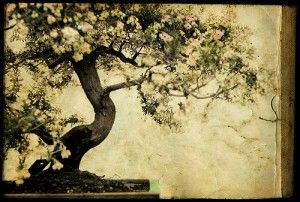From the Eastern Notebooks

On Zen
In the seventh century, Hung Jen, the fifth patriarch of Chinese Zen Buddhism, neared death. In order to choose a successor, he asked each monk to compose a verse that testified to the monk's Zen insight and post it on the wall. Shen Hsiu, the illustrious heir apparent, composed the following:
The body is the Bodhi-tree,
The mind is like a clear mirror standing.
Take care to wipe it all the time,
Allow no grain of dust to cling to it.
An uneducated kitchen worker named Hui Neng disagreed with the verse, and wrote beside it:
The Bodhi is not like a tree,
The clear mirror is nowhere standing.
Fundamentally not one thing exists:
Where then is a grain of dust to cling?
The Patriarch favored Hui Neng's verse and appointed him successor. Zen at this point split into two schools, the Northern School (under Shen Hsiu) and the Southern School (under Hui Neng). The Southern School became the dominant school and the doctrines now associated with Zen are from the Southern School. One of the Southern School's, and therefore Zen's, enduring hallmarks is its disdain for the “mirror wiping” counsel of the Northern School.
Zen as it developed in the Southern School has always disdained mirror wiping because, by emphasizing the mirror, the “mirror wiper” asserts that he is renouncing himself in order to create a pure self–with the result that either way he is celebrating himself. His self may become more pure, but it continues to stand strong. In the words of Thomas Merton, the mirror wiper renounces his “empirical autonomy in order to sink into [his] spiritual, pre-biological nature. But since this nature is regarded as one's possession, the 'spiritualized' ego thus is able to affirm itself all the more perfectly, and to enjoy its own narcissism under the guise of 'emptiness' and 'contemplation.'” It is the religious version of having your cake and eating it, too.
Zen tries to eliminate the self altogether as a separate entity, emphasizing rather the pure act of existing. It seeks awareness of pure being beyond subject and object, beyond “I-Thou.” It relentlessly seeks to destroy all figments of the mind that pretend to convey meaning in hopes of helping the disciple dwell in existence–pure, simple existence, without the clamor of self-seeking gratification, either spiritual or carnal.
This the goal behind Zen's absurd or shocking sayings, such as “If you meet the Buddha, kill him,” or, in response to a heavily-metaphysical question, the irrelevant words: “When I lived in Seiju, I made a robe out of hemp and it weighed ten pounds.” Such sayings are metaphorical slaps in the face that, like the physical slaps doled out by Zen masters, are designed to wake up the hearer to the pointlessness of trying to sort out ontological problems instead of simply dwelling in being.
Zen of the Southern School is what westerners learn when they dabble in far eastern metaphysics, and I've long been enamored with the whole concept of "just looking," without thinking about yourself at all. On three difference occasions in my life, I've submerged myself into Zen readings, most recently, in John Wu's excellent The Golden Age of Zen: Zen Masters of the T'ang Dynasty.
I see a lot of parallels between Zen and the philosopher Samuel Alexander, an Australian favorite of C.S. Lewis', who, citing Alexander, pointed out, in Surprised by Joy, that “enjoyment and the contemplation of our inner activities are incompatible. You cannot hope and also think about hoping at the same moment. Of course the two activities can and do alternate with great rapidity; but they are distinct and incompatible. . . The surest way of spoiling a pleasure [is] to start examining your satisfaction. . . [N]early everything that was going on a moment before is stopped by the very act of our turning to look at it."
I also see parallels with lots of other western thinkers and writers that I enjoy: Kierkegaard's Knight of Faith, Kerouac and the Beat Generation, St. Therese's Little Way, St. John of the Cross' words “All good things have come to me since I no longer seek them for myself," and the general outlook of little children.
But as I've gotten older, I've come to appreciate Shen Hsiu (as did Hui Neng, it should be mentioned). In fact, I think too much emphasis on "just looking" leads to problems. In particular, problems of intense selfishness, pneumatic antinomianism (my favorite pretentious phrase), and similar sinful phenomena.
Because here's the problem: You might, Zen-like, cultivate the attitude of "just looking" and ignore yourself, but your self doesn't cease to agitate. Self-forgetfulness is good, but not sufficient. You must keep an eye on the self. It will never be an obedient slave.
You might try to forget about the self, but the self doesn't forget to be the self. Occasionally, you have to beat it, to chastise it.
With the goal that it will remember to be forgotten.
